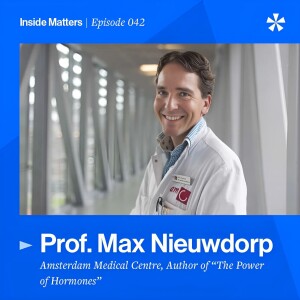
Thursday Mar 27, 2025
Gut Health, Hormones, Fat Loss, and GLP-1's with Professor Max Nieuwdorp
In a fascinating conversation with Professor Max Nieuwdorp of the Amsterdam Medical Centre, Dr James McIlroy explores groundbreaking ideas and research surrounding the microbiome, hormones, and their profound impact on metabolic diseases. This insightful dialogue uncovers the remarkable potential of faecal microbiota transplant (FMT) and emerging pharmaceutical strategies in tackling obesity, diabetes, and even cancer.
Timestamps:
The Journey into Microbiome Research
Professor Nieuwdorp's interest in the microbiome began serendipitously during his postdoctoral studies at UCSD. There, he encountered revolutionary ideas, particularly through the work of Jeffrey Gordon, which highlighted the significance of the microbiome long before it became widely acknowledged. An unforgettable early success with FMT on a patient with Clostridium difficile infection set the foundation for his enduring commitment to this field. Over the years, Nieuwdorp has been involved in pivotal studies, evolving his understanding of how microbiome therapies could be used in metabolic diseases and beyond.
Understanding FMT and Its Role
FMT has shown remarkable efficacy, especially in treating infections like Clostridium difficile. The discussion highlights an astounding 90% cure rate demonstrated in early trials, a feat Nieuwdorp describes as "seminal". Nonetheless, expanding this success to metabolic conditions such as obesity and autoimmune diseases remains a promising, yet ongoing, challenge.
The Nexus Between Microbiome and Obesity
While the connection between the microbiome and obesity remains a complex issue, Nieuwdorp emphasises how the microbiome's role in weight control is likely more significant over the long term—akin to directing an oil tanker—than as a quick fix. The conversation delves into why the body finds it easier to gain weight than to lose it, considering genetic predispositions and evolutionary pressures. This adaptability of the microbiome, combined with dietary habits, may significantly influence how our bodies metabolise and store energy.
Revolutionary Treatments on the Horizon
Emerging pharmacological treatments such as GLP-1 agonists are causing waves in medicine. These drugs, alongside the potential of next-generation probiotics, promise to reshape how obesity and associated conditions are treated. Intriguingly, research continues to suggest the microbiome might itself produce GLP-1, hinting at a future where therapies target these microbial mechanisms directly.
The Path Forward: Microbiome as a Predictive Tool
Professor Nieuwdorp envisions a future where microbiome profiling becomes a standard diagnostic and preventative tool. It has the potential to predict disease susceptibility, allowing for earlier and more personalised interventions. In parallel, the continued development of FMT and its derivatives may revolutionise treatments for a range of conditions, from cancer to metabolic disorders.
The Educational Perspective: "The Power of Hormones"
In addition to his pioneering research, Nieuwdorp shares insights in his book, The Power of Hormones, presenting a layperson’s guide to understanding hormones across a lifespan. This book interweaves historical narratives with scientific discussion to elucidate how hormones and the microbiome intersect in influencing daily life.
This extensive dialogue with Professor Nieuwdorp is a testament to the potential of microbiome science and the exciting horizon that awaits both researchers and patients. As innovations continue, integrating microbiome knowledge with traditional medical interventions could profoundly change how we understand and treat human health.
No comments yet. Be the first to say something!